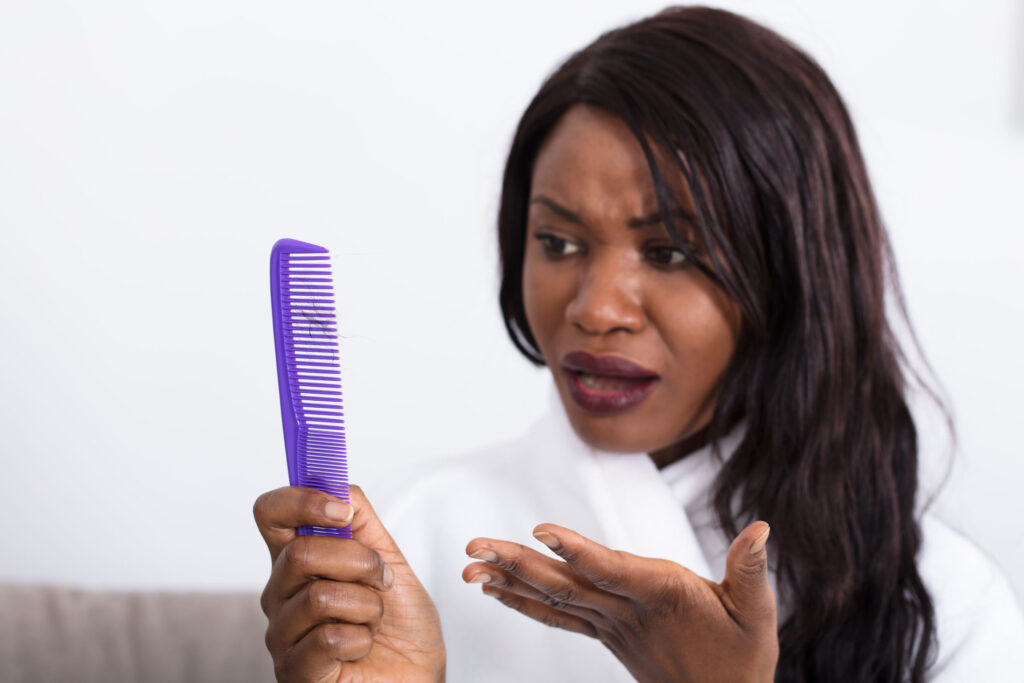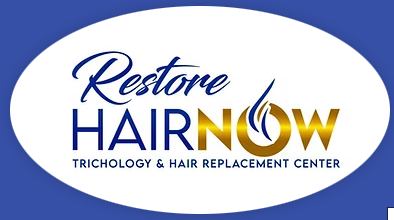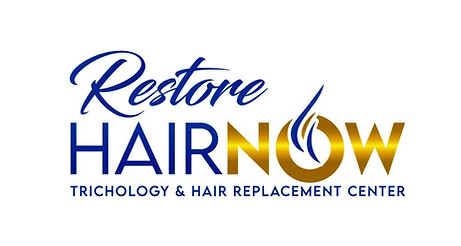
In today’s fast-paced world, stress is an unavoidable part of life. But did you know that chronic stress could be sabotaging your hair health? If you’ve noticed excessive shedding, thinning hair, or slowed hair growth, your stress levels might be to blame. Let’s explore the connection between stress and hair loss—and, more importantly, what you can do to regain control. How Stress Affects Your Hair 1. Telogen Effluvium: The Stress-Induced Shedding Cycle One of the most common ways stress leads to hair loss is through telogen effluvium—a condition where stress pushes hair follicles into a “resting” phase. Instead of growing, the hair stays dormant and eventually falls out, leading to noticeable thinning. This type of hair loss usually occurs 2–3 months after a stressful event and can last for several months. 2. Hormonal Imbalance and Cortisol Overload Chronic stress leads to increased production of cortisol, the body’s primary stress hormone. High cortisol levels can interfere with the hair growth cycle by shortening the anagen (growth) phase and prolonging the shedding phase. Additionally, cortisol can disrupt thyroid function and other hormones crucial for maintaining strong, healthy hair. 3. Stress and Scalp Health Stress doesn’t just affect your internal health—it also shows up on your scalp. Many people experience increased scalp inflammation, oiliness, or dandruff during stressful periods. These scalp issues create an unhealthy environment for hair follicles, making hair more prone to breakage and loss. 4. Stress-Related Hair-Pulling (Trichotillomania) For some individuals, stress triggers a condition called trichotillomania, a compulsive urge to pull out one’s hair. This habit, often linked to anxiety or emotional distress, can lead to patchy hair loss and permanent follicle damage if not addressed. How to Reduce Stress and Protect Your Hair The good news? Stress-induced hair loss is often reversible if you take proactive steps to manage stress and nourish your body. 1. Practice Stress-Relief Techniques Incorporating relaxation techniques into your routine can help lower cortisol levels and promote hair regrowth. Try: • Deep breathing exercises (such as the 4-7-8 technique) • Meditation and mindfulness to calm the nervous system • Regular exercise to improve circulation and reduce tension • Journaling or therapy to process emotional stress 2. Prioritize Scalp and Hair Care Give your hair the best chance to thrive by maintaining a healthy scalp environment: • Massage your scalp daily to improve blood circulation • Use gentle, sulfate-free shampoos to avoid stripping natural oils • Apply essential oils like rosemary, peppermint, or lavender to stimulate hair follicles • Limit heat styling and harsh chemical treatments that can weaken stressed hair 3. Nourish Your Body for Hair Growth Chronic stress depletes vital nutrients that your hair needs to grow. Focus on: • Protein-rich foods (lean meats, eggs, beans) to strengthen hair strands • Iron and zinc to prevent deficiency-related hair loss • Omega-3 fatty acids (salmon, flaxseeds, walnuts) to support scalp health • Biotin and vitamin D to promote hair growth and reduce shedding 4. Improve Your Sleep Routine Lack of sleep exacerbates stress and hormonal imbalances, further accelerating hair loss. Aim for 7–9 hours of quality sleep per night by: • Reducing screen time before bed • Creating a relaxing nighttime routine • Using magnesium or herbal teas (chamomile, valerian) to improve sleep quality 5. Seek Professional Support if Needed If stress-related hair loss persists, consider consulting a trichologist or healthcare professional. They can help determine if other underlying health issues—such as thyroid imbalances or nutritional deficiencies—are contributing to your hair concerns. Final Thoughts: Regain Control Over Stress and Your Hair Health Stress is an inevitable part of life, but it doesn’t have to dictate your hair’s health. By taking a holistic approach—reducing stress, nourishing your body, and maintaining a healthy scalp—you can reverse stress-induced hair loss and support long-term hair growth. Have you noticed stress affecting your hair? Let’s continue the conversation! Share your experiences or ask questions in the comments below.

When it comes to changing your look, hair extensions offer an impressive transformation. These aren’t just tools for adding length or volume; they can boost your confidence and help you express your unique style. This post examines how hair extensions can bring out a new version of yourself, empowering you to embrace your individuality and enhance your self-esteem. Discovering the Power of Hair Extensions Hair extensions provide a flexible solution for common beauty concerns. Whether you’re coping with thinning hair, damaged strands, or simply want a refreshed appearance, extensions can dramatically change your hairstyle without the need for a permanent haircut. Available in varied materials, lengths, and colors, they can effortlessly blend with your natural hair. For example, a woman with shoulder-length hair can go for 20-inch clip-in extensions for a special event, transforming her look instantly. This ability to experiment can boost your confidence, as trying out different styles and colors allows you to find what makes you feel best. Additionally, studies show that nearly 80% of women feel more confident when they like their hair. Think about how often you admire a friend’s vibrant hair color or a fancy updo—it sparks inspiration and can encourage you to explore new styles for yourself. Enhancing Your Self-Image How we perceive ourselves significantly impacts our daily lives. If you’ve ever felt self-conscious about your hair, you know how it can affect your mindset. Hair extensions serve as a quick fix to boost your confidence. When you glance in the mirror and love your hairstyle, it feels like wearing a stylish accessory. A fabulous hairdo can change your entire day, giving you the push to face any challenge, be it a job interview, a romantic evening, or casual brunch with friends. For instance, one study found that individuals who feel attractive are more likely to be seen as competent and likable by others. Choosing the Right Type of Extensions With so many options—ranging from clip-ins to micro-links—selecting the right type of extensions is crucial. Clip-in extensions are great for those who want a temporary style change, while tape-in or keratin bond extensions provide a longer-lasting solution. Think about your lifestyle and hair type before making a decision. Getting advice from a skilled stylist ensures that your chosen extensions complement your natural hair. For example, those with fine hair might benefit from tape-in extensions, which lay flat and are less likely to cause damage, while someone with thick hair might choose clip-ins for easy versatility. Maintenance and Care Owning hair extensions comes with the responsibility of keeping them in good condition. Regular cleaning, careful styling, and proper storage when not in use are essential practices. A recent survey revealed that users who invest time in maintaining their extensions enjoy them for up to 50% longer—ensuring that they remain vibrant and full of life. As you adapt to your new hair, experiment with styles that reflect your personality. Your hair can become a key part of your identity, showcasing who you are, both inside and out. Embracing Your New Look Hair extensions do more than just enhance your appearance; they empower you. The right hairstyle can reenergize your confidence, making you feel beautiful and ready to take on challenges. So why hesitate? Amplify your look with hair extensions and step confidently into every situation. As you embark on this journey to explore your new self, remember that true beauty stems from feeling good about yourself. Hair extensions are just one tool to elevate that experience. Get ready to reveal the new you—your confident, stylish self!

Your body is far smarter than most people think. Your body knows that your hair is not that important to you, health wise, but emotionally is a different story. So when the body falls short on nutrition, protein, vitamins and minerals, the hair is the last to get it their benefits. Think of it this way, your body knows that to live you need your heart and brain more than you need your hair, which is why diet, stress, disease and other factor play such important factors to people’s hair loss. Your hair needs a balanced, nutritious diet to stay healthy. A balanced plan consists of fruits and vegetables for antioxidants, whole grains for minerals, nuts and seeds for minerals and vitamins, and lean protein for iron. Your hair is made of protein so lean protein is very important. You also need lots of water to hydrate your body and keep your hair healthy and shiny. Fruits, vegetables and grains provide the fiber that is also very good for your body and hair. Soy products that contain phytoestrogens, which are estrogens from plants, are good as well. Reducing fat can also help because fat is broken down in the body to many pieces, one of which is Testosterone. Testosterone often found in Male Hormones, but can also be found in women as well. Testosterone breaks down to DHT, which is the major cause of hair loss for both men and women. That being said, the more fatty foods you eat the more likely the chance of having more DHT to bind to the androgen receptors at the end of your hair follicle, which is where your hair grows from. DHT binding to the androgen receptors causes your hair to shrink and fall out. Smoking and alcohol also play a major factor, which can affect your hair, so the less you do the better. So, eat the best you can, and supplement your diet with a daily Multi-vitamin and hair support product like HLCC Scripts Complete, to help stop hair loss and control the amount of dht, which ultimately causes hair loss.




